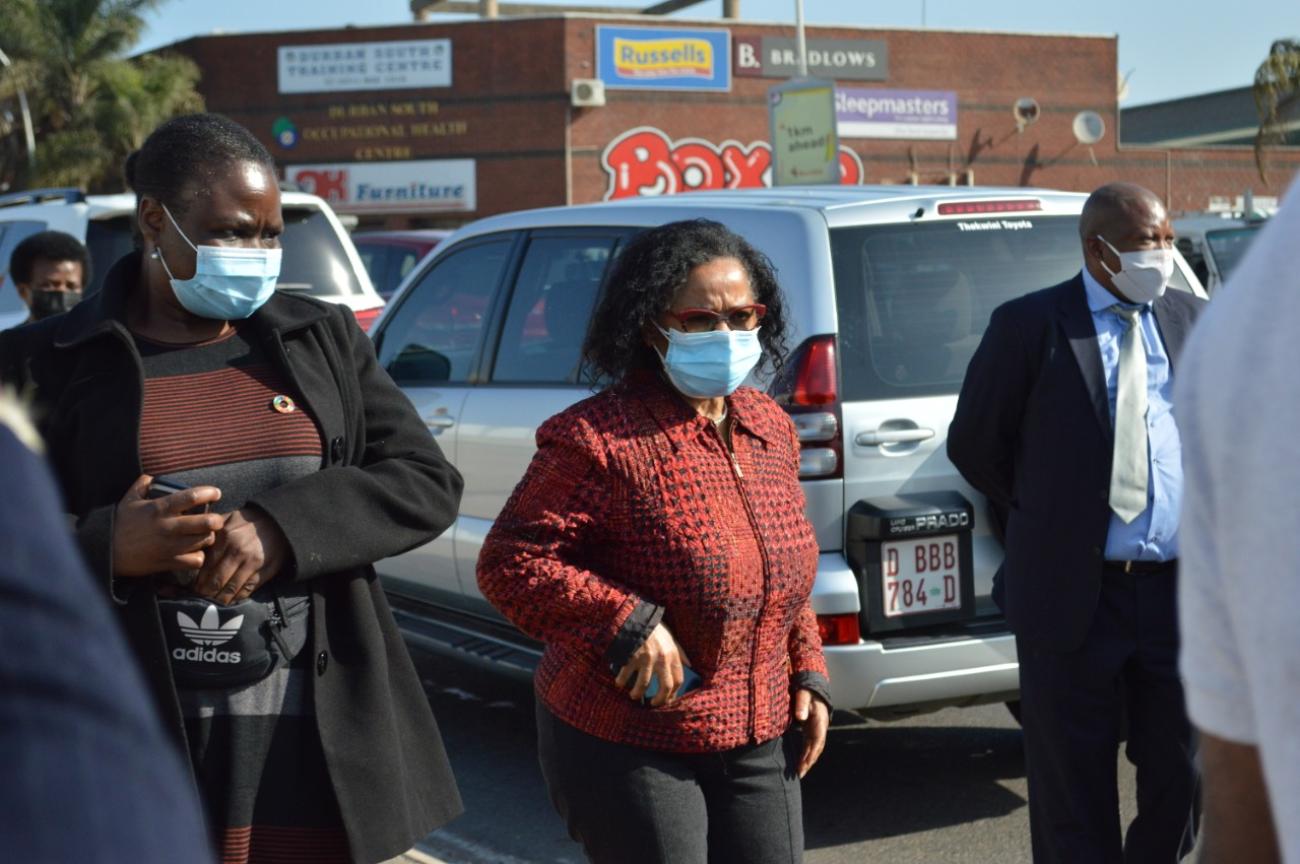“It really hurts,” Thulukani tells me, as he reflects on the destruction of Intokozo FM’s studios just two weeks ago.
The community radio station in Umlazi township, Durban, was one of the victims of the recent unrest and violence that plagued large parts of KwaZulu-Natal and Gauteng provinces in South Africa.
“When they came, I just ran, they [looters] were not going to be stopped from destroying everything,” Thulukani adds, as we stand outside the studio’s shattered windows and empty shell.
I’m in Durban with a UN team to assess the widespread damage and to identify priority areas of response, following what the Ethekwini Mayor’s office refers to as ‘the madness’ that left more than 300 people dead, including at least three children.
An acute and long-term emergency
The devastation is clear to see as we drive cross the city. A burnt-out family-run pharmacy that stood for 80-years, a devastated mini-supermarket and ATM machines ripped out of mall walls.
The result is an estimated 2 billion Rand [US$13.7million] of damage across KwaZulu-Natal province, including 139 devastated schools. Many classrooms that were on the verge of re-opening for all primary school children now burnt-out shells.
At the KZN Premier’s Office a large media presence is testament to the seriousness of the situation.
The mayhem “gripped us while we were battling the crippling effects of COVID-19, which is devouring our economy in a large scale,” explains KwaZulu-Natal Premiere, Sihle Zikalala.
And while we’re in the city, the province declares a state of disaster.
The UN commits to setting up a task team to support the response and the UN Resident Coordinator, Nardos Bekele-Thomas, highlights how we are faced with an immediate and “mid to long-term emergency that includes an urgent need to promote social cohesion to avoid a recurring crisis.”
Lives and opportunities lost
Chesterville township straddles the bank of a steep hill, some 13kms west of Durban city. Below the housing shacks is a small business complex that hosts Innovate Durban.
The tech lab was positioned here to provide opportunities for disadvantaged young people to build their digital skills and to maximize their creativity, with the goal of accessing tech related work. Today, it’s another empty shell after looters took whatever they could find.
“We’ve had young people from the community coming to us to say they are sorry [about what happened] and asking when we will open up again,” explains Amy Benn, the Innovation Lab Co-Lead.
At the bustling Isipingo shopping area, south of the city, it’s a similar story. Junaid, the business community chairperson, was upbeat explaining how the area was developing despite the impact of COVID-19. “For years we were working with the community and we were seeing real progress,” he says, as we stand in front of another burnt out building.
The reality for many people in the Isipingo community is that they can’t simply afford to pay for a shared taxi to take them to another pharmacy, or another market, local businesses are their lifeline.
Recover and build back together
The physical rebuilding of parts of Isipingo and other areas will be vital to help revive livelihoods, but it will need to go together with a healing process that brings young people into the dialogue.
UNICEF, with other UN agencies and partners are setting up programming to respond. With private sector support, UNICEF is providing immediate relief items, helping schools to get up and running again, as well as offering psychosocial support and engaging community leaders and young people in peace dialogues to promote a safer, fairer, and better tomorrow.
There is a sense of shock among everyone we meet about the intensity of the unrest and a soul searching as to why people would destroy local resources, which only makes their everyday survival harder and opportunities fewer.
But there is also a realism that while the violence was so destructive, it was also a wake-up call, to not lose sight of ‘Ubuntu’. The Zulu term that is so apt at this moment, ‘I am because you are’, a togetherness that reflects how our actions impact on others and society.
Moving forward step-by-step
After one-week off air, Intokozo FM found a temporary studio and DJ Fabulous delivers the daily drive-time show again. UNICEF is working with Intokozo and other radio stations to re-equip and to roll-out youth-led programming that promotes dialogue and positive community engagement.
At the Innovation Lab, Amy Benn and the team are planning to open their doors as soon as possible. “We were down and heartbroken but after a week we are up again and committed to providing services to the community,” says Benn.
Back at the Ethekwini Municipality offices, three young men from the Durban Community Choir sing passionately. “The tears of hope are running down my skin, hope, hope, hope,” it’s a fitting sentiment that we hear again and again.
“We need to release this hope in young people, to find that space, there is too much fear,” says Bishop Rubin Phillip who we meet at Accord, an NGO promoting peace and dialogue across Africa. Words that carry a lot of weight following the Bishop’s years of fighting apartheid and advocating for pro-poor policies with friends such as Steve Biko.
There’s a determination to recover from this latest crisis but with COVID-19 still rampant and inequality widening these are difficult days.
“The response must come from inside, from the community itself, not from the outside,” stresses Bekele-Thomas, as the UN visit draws to a close and the recovery starts in earnest.














